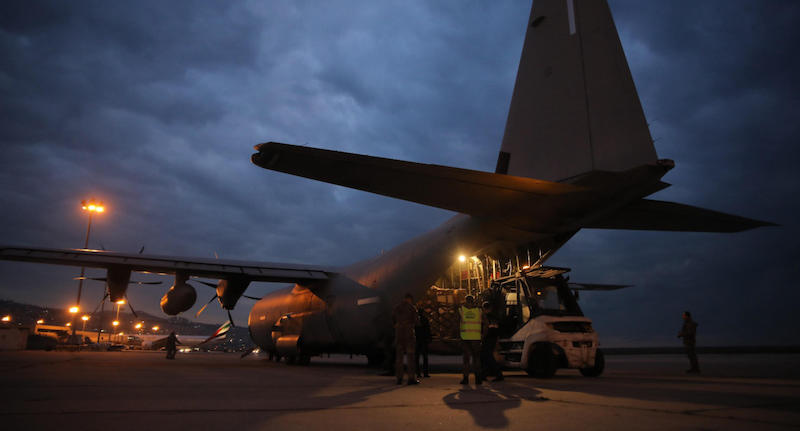Between Saturday and Sunday, Italy was the first European Union country to send humanitarian aid to Syria after the earthquake that hit a large region between Turkey and Syria last week, causing tens of thousands of deaths and enormous damage. The aid includes four ambulances and 13 pallets of medical and relief materials. They were flown in two large C-130 military aircraft to Beirut airport in Lebanon; from there they were then taken over by the Syrian Red Crescent, the equivalent of the Italian Red Cross, and were taken by land to Damascus, the capital of Syria. A team of four doctors is also on the way.
The first ever European shipment of assistances reached #Syria from Italy through @SYRedCrescent pic.twitter.com/cq5jpqGBVp
— Syrian Red Crescent (@SYRedCrescent) February 13, 2023
There have been numerous difficulties and uncertainties regarding aid to Syria in recent days, mainly due to the fact that control of the areas affected by the earthquake is in fact divided between the Syrian regime of Bashar al Assad and the rebels who still dominate the north-west areas of the country after the Syrian civil war, which has been going on for over ten years and has never really ended. Both the rebel-controlled regions of northwestern Syria, including the city of Idlib, and cities such as Aleppo and Latakia, which are controlled by the regime, have been severely damaged by the earthquake.
The Assad regime demands from the international community that all aid reach Damascus, and maintains that it will then take care of distributing it to rebel-controlled areas. But the rebels do not trust and fear that, as has already happened in the past, the regime will use the aid as a weapon of blackmail, or to starve the population in the areas controlled by them.
Furthermore, the United States and the European Union have for years been imposing very harsh economic sanctions against the Assad regime, accused of brutality and war crimes during the civil conflict. For this reason, in the first days after the earthquake there was a certain uncertainty on the part of the West about how to manage aid to Syria. Before the earthquake, it was Turkey, which controls the Bab al Hawa border post and has relations with the various rebel groups, to send humanitarian aid and materials to the rebel-controlled areas. But now the Turkish government is busy with the devastating earthquake situation on its territory, and the crossing is partially unusable.
– Read also: International earthquake aid will struggle to reach Syria
The situation partially unblocked at the end of last week, when the Syrian regime officially requested to activate the European Civil Protection Mechanism, a system managed by the European Union to send humanitarian aid to third countries affected by disasters. The request was accompanied by some guarantees from the regime, which allowed the governments of the European Union to mobilize the first aid, albeit with some caution. The governments of Italy and Romania they were the first to offer to send themand the Italian ones were the first to arrive.
Under the coordination of #FarnesinaItaly’s aid to earthquake victims in #Syria were delivered today to the Red Crescent @SYRedCrescent. Among these, ambulances, medicines and health materials offered by the @grupposandonato pic.twitter.com/yh8TmeGzSu
— Farnesina 🇮🇹 (@ItalyMFA) February 12, 2023
That there is, however, a certain caution is shown by the fact that Italy has not sent aid directly to Damascus, as the Arab states allied with the Syrian regime do, but to neighboring Lebanon, to then entrust the load to the Syrian Red Crescent (which is in any case close to the regime).
It is also unclear what guarantees the Assad regime has offered that it will not starve rebel-held areas. As he wrote are Republic Daniele Raineri, in recent years the regime «has been accused by the United Nations of having appropriated part of the aid intended for the population and of having made political use of it. In particular, to have denied food and medicine to the disobedient areas. For this reason there is the fear that the Assad regime could also exploit this crisis».
However, the Italian government has made it known that it intends to send aid not only to the Assad regime, but also to areas controlled by the rebels, even if it is not yet clear how this could happen. The United States, for example, would be looking the collaboration of the Kurds, who control the north-eastern areas of Syria, which were little affected by the earthquake. Dan Stoenescu, the head of the European Union’s delegation to Syria, wrote on Twitter that European aid would soon reach “all regions of Syria”.
Thanks to the Minister @Antonio_Tajani and to Italy🇮🇹🇪🇺 for the generous humanitarian support to the Syrian people! Aid has come to #Beirut thanks to @maxdantuono. More aid will arrive 🇪🇺 for all regions of Syria! We Europeans are united to help the Syrian people! https://t.co/W7671Q9TxQ
— Dr. Dan Stoenescu (@DanStoenescuEU) February 11, 2023
